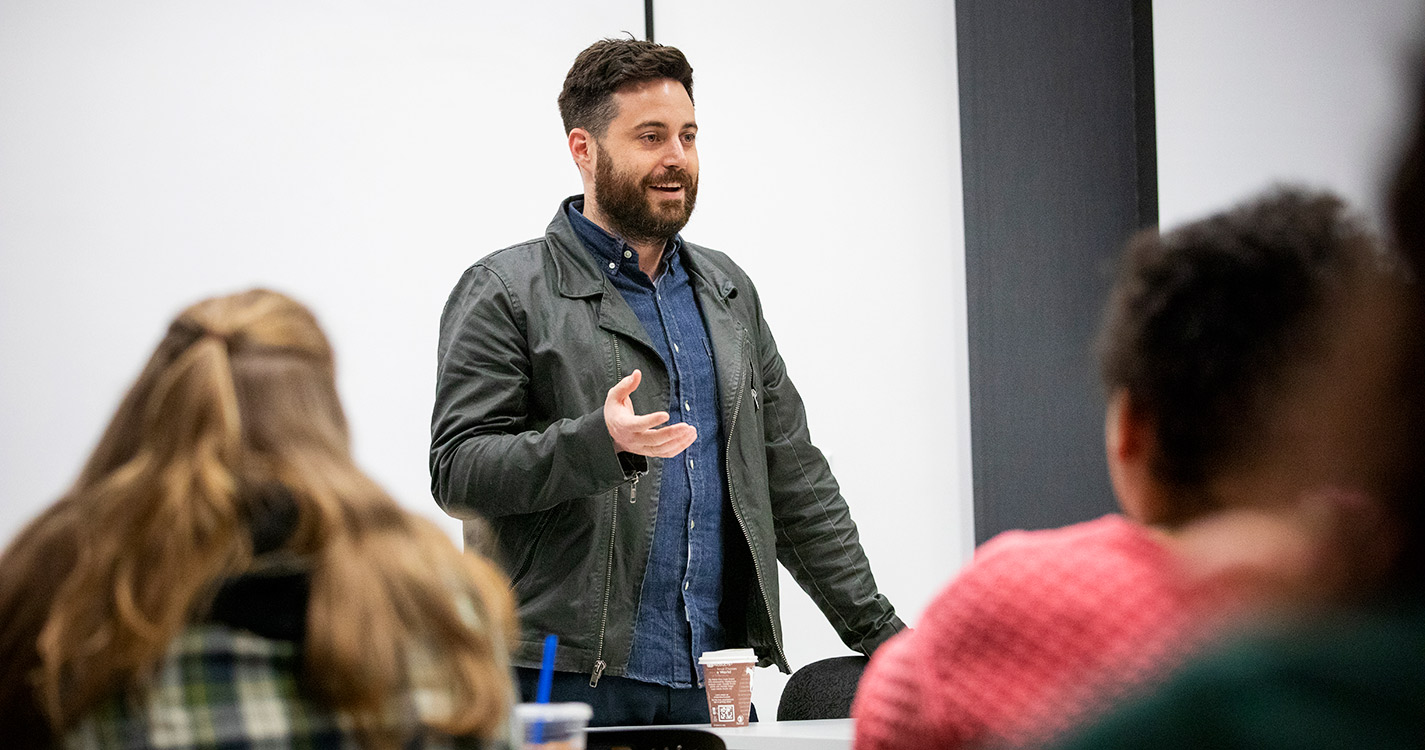By the time author Garrard Conley visited Willamette University, he’d recounted his story of surviving rape, being outed as gay by his perpetrator and sent to conversion therapy by his parents countless times.
Repeating traumatic experiences can make it difficult to move on, but Conley is compelled to — his story is activism as much as art. He and other LGBTQ activists are working to end conversion therapy in the United States and abroad.
In Ford Hall on April 9, Conley met with students in a “Fellini and the Arts” class to discuss how his trauma became the basis of his memoir, “Boy Erased: A Memoir of Identity, Faith and Family” then a 2018 film starring Lucas Hedges and Oscar winners Nicole Kidman and Russell Crowe.
Students spent more than an hour quizzing Conley about the complexities and challenges of writing a memoir, his feelings about the film and its aftermath. Later that evening, Professor of Art History and Cinema Studies Ricardo De Mambro Santos moderated a discussion for the greater community.
After both events, students were eager to continue the conversation with Conley, said De Mambro Santos.
“Art can be vital to promoting discussions and opening the road for a potential exchange of ideas, especially when it addresses topics that are considered taboo in certain contexts, such as the connection between gender identity and religious experiences,” he said. “Every second of conversation seemed to open new horizons of ideas.”
Resilience in the face of hatred
When Conley was 19, he was raped by a classmate who outed him to his southern Baptist minister father and mother.
His parents sent him to the Memphis-based Love In Action (LIA) program, which he describes as part Alcoholics Anonymous, part fundamentalist Christian concepts and part “shoddy” Freudian theories that were supposed to make him heterosexual.
He told students how LIA’s rules dominated every part of his life, from the way he dressed to the manner in which he stood, and required him to do exercises like recounting sexual encounters without using sexual language to “restore” him to the man he was before becoming gay. While they tried to erase him, he was trying to erase himself, too, he said.
He left LIA after he saw similarities in the negative messages he’d been told when he was young (“You’re not OK the way you are,” or “You’d be great if you could only change” your homosexuality) and those of the program that encouraged him to hate his parents, he said.
“People claimed to be Christians but they used hatred as a tool,” he said. “Only by speaking in their own language was I able to get out of it. Even today I’m able to critique their stances better because I know their language.”
As traumatizing as the experience was for him, he noted he can’t fully renounce religion — he identifies as atheist but still finds it full of cultural value and history. He approached writing the story and portrayal of his parents with compassion. One theme of the memoir is “the terrifying things people do out of love,” he said.
He said he also wanted to infuse it with “this queer perspective that’s kind of fun and sometimes able to see irony. It’s able to look back on things and frame them in a really powerful way than the way straight people might frame it.”
“I knew there were so many terrible things that have happened to our community, and so many sad stories,” he said. “I was adding a sad story to it, but I wanted there to be this sense of resilience.”
Honest adaptation
Once his memoir was acquired for film adaptation, he was thrilled about the casting of Kidman — Stanley Kubrick’s “Eyes Wide Shut,” in which she stars, is one of his favorite films — and Crowe’s performance of his dad was uncanny, he said.
Watching a film about himself was hard, and he only saw it three or four times because he had to at festivals. He said, “I felt like I was watching a more objective version of what had happened, and it was like seeing it for the first time from someone else’s perspective.”
Director Joel Edgerton gave Conley veto power over the script that he used only once. Edgerton wanted a tidy ending with Conley’s father completely coming around, but the author put his foot down.
“I was offended. I knew he wanted to make a hit, but I didn’t want him to sell out what the main issue was,” he said. “I wanted to show there was still growth. My dad isn’t perfect, neither am I, and I felt that it would compromise our story to say that we’re just done.”
Conley’s life changed as a result of the book and film. The widespread attention triggered an outpouring of support, filling his inbox with stories similar to his, but it also strained relationships and narrowed the number of people who stood by him to one hand. But the experience has also forced him to be a more honest person, one who refuses to choose social politeness over true opinion.
”That’s what we have to do,” he said. “It’s not that I don’t respect people as people, I am just no longer willing to capitulate to really terrible belief systems that have destroyed people like me.”


